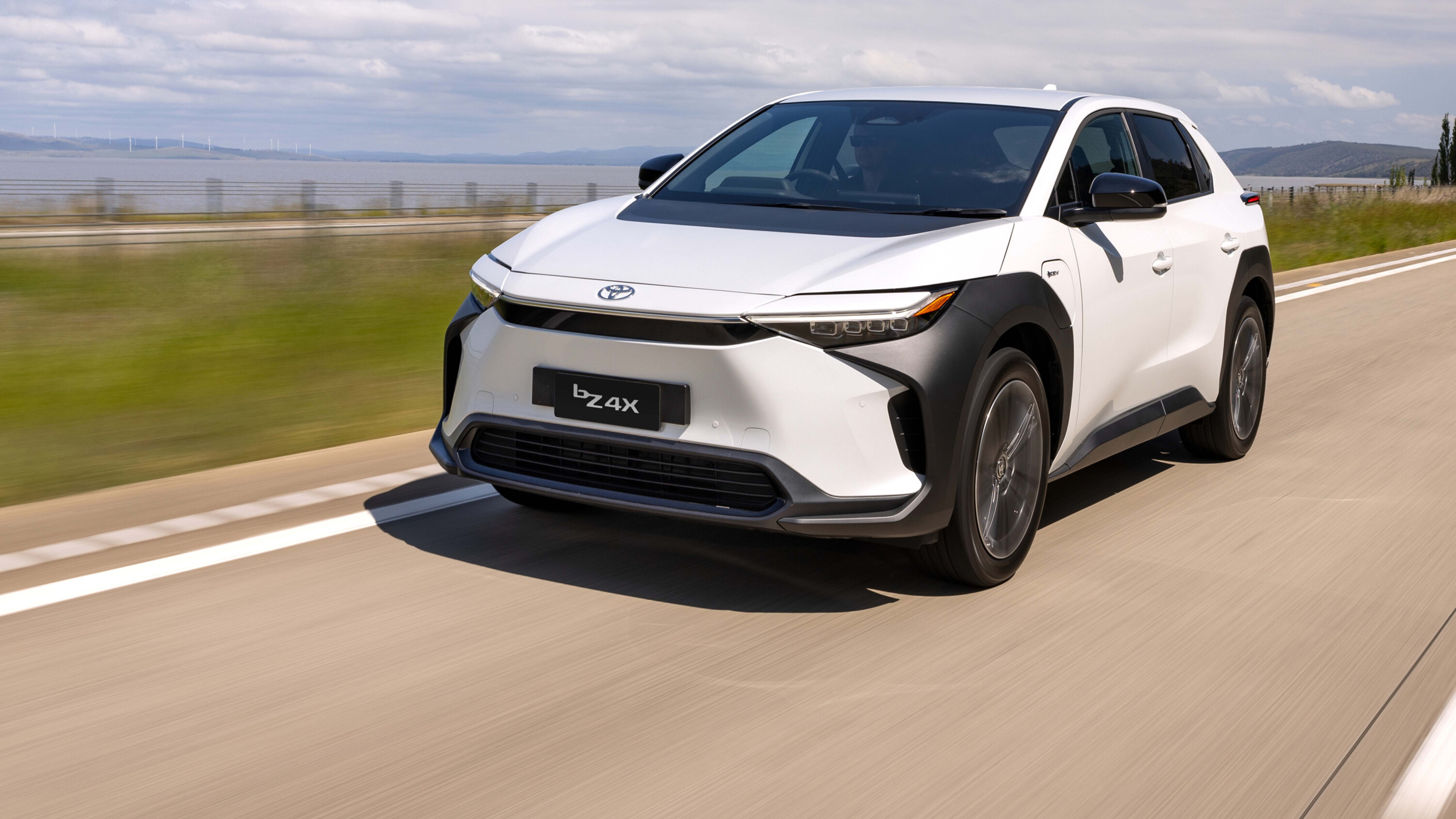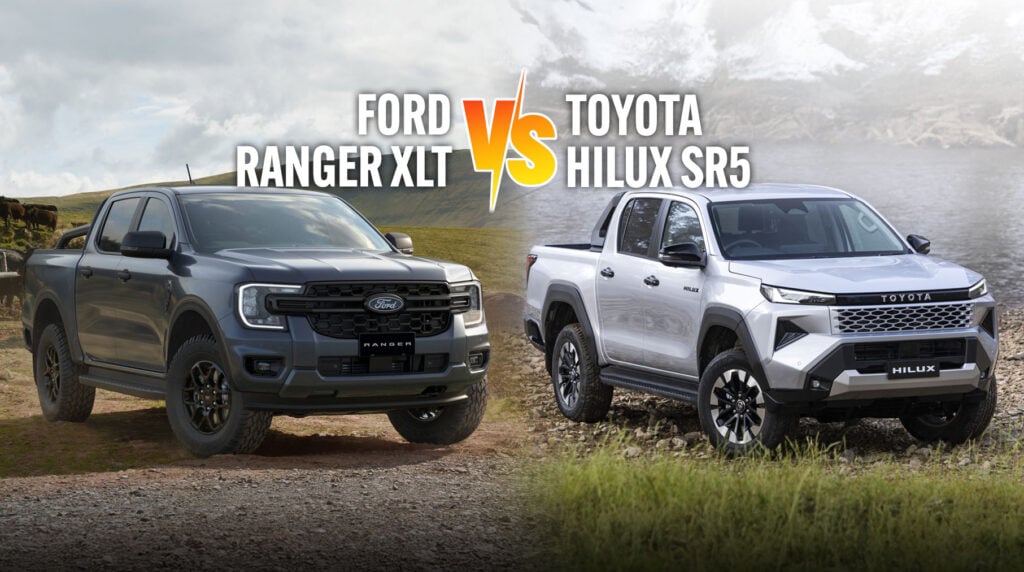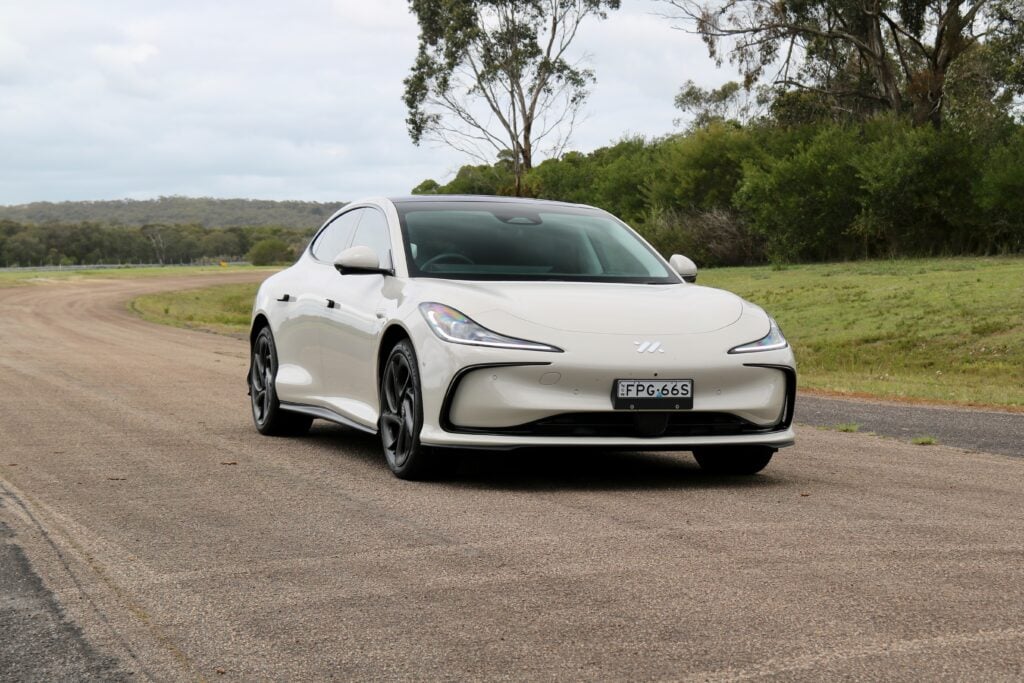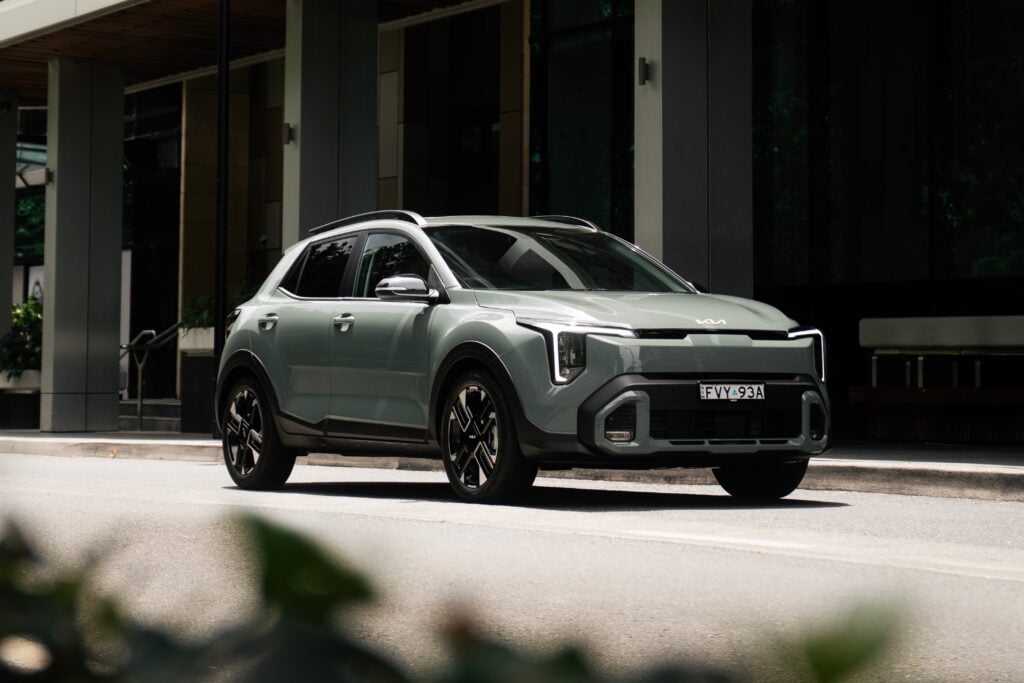Score breakdown
Things we like
- It’s an electric RAV4
- Thoughtful cabin storage
- Steadfast handling
- Smooth and user-friendly drivetrain
Not so much
- Limited real-world range
- Tyre roar on coarse chip
- Back seat is big on legroom but not much else
- Cheap materials in obvious places
The 2024 bZ4X is Toyota’s first electric vehicle. And that’s big news, because, although it didn’t launch the first hybrid, Toyota’s Prius made petrol-electric cars cool (not to motoring enthusiasts, mind you); the nameplate transcended transport to become a statement piece for eco-conscious people in the limelight.
You’d think transitioning to battery electric vehicles (BEVs) should be a natural next step – hybrid battery know-how combined with Toyota’s obsessive pursuit of reliability.
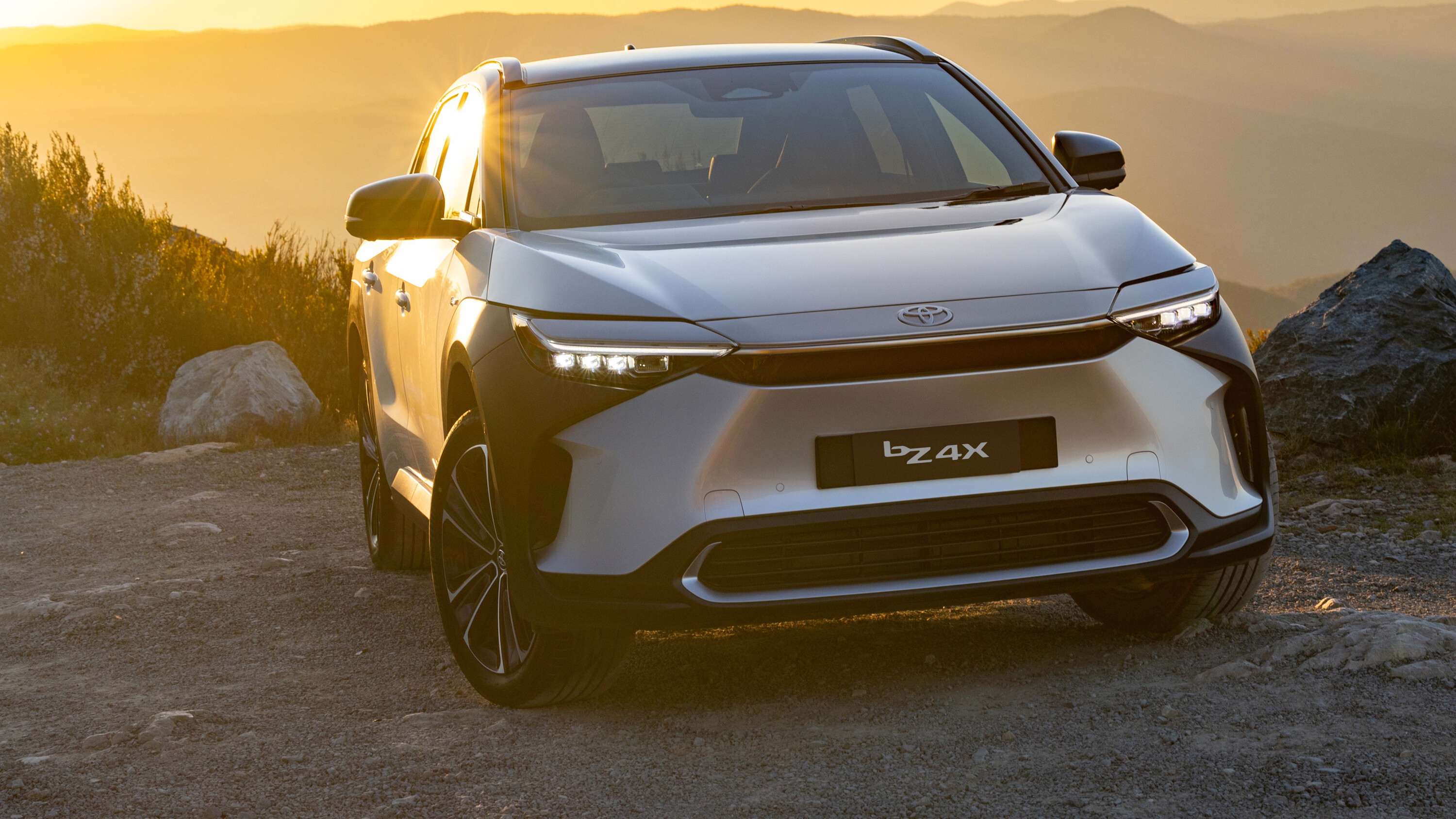
But the bZ4X project was late to kick off with platform development not commencing until 2018.
A global reveal of the near-production concept in 2021 was frustratingly followed by delays and production issues for both the Toyota bZ4X and its platform-shared Subaru Solterra twin.
Three years later, the Toyota bZ4X has arrived in Australia with a modest goal of 1500 deliveries in its first 12 months on sale. We were invited to Australia’s capital, Canberra, (where plenty of EV-related discussion is occurring) to sample Toyota’s first effort on a combination of testing tarmac and dirt.
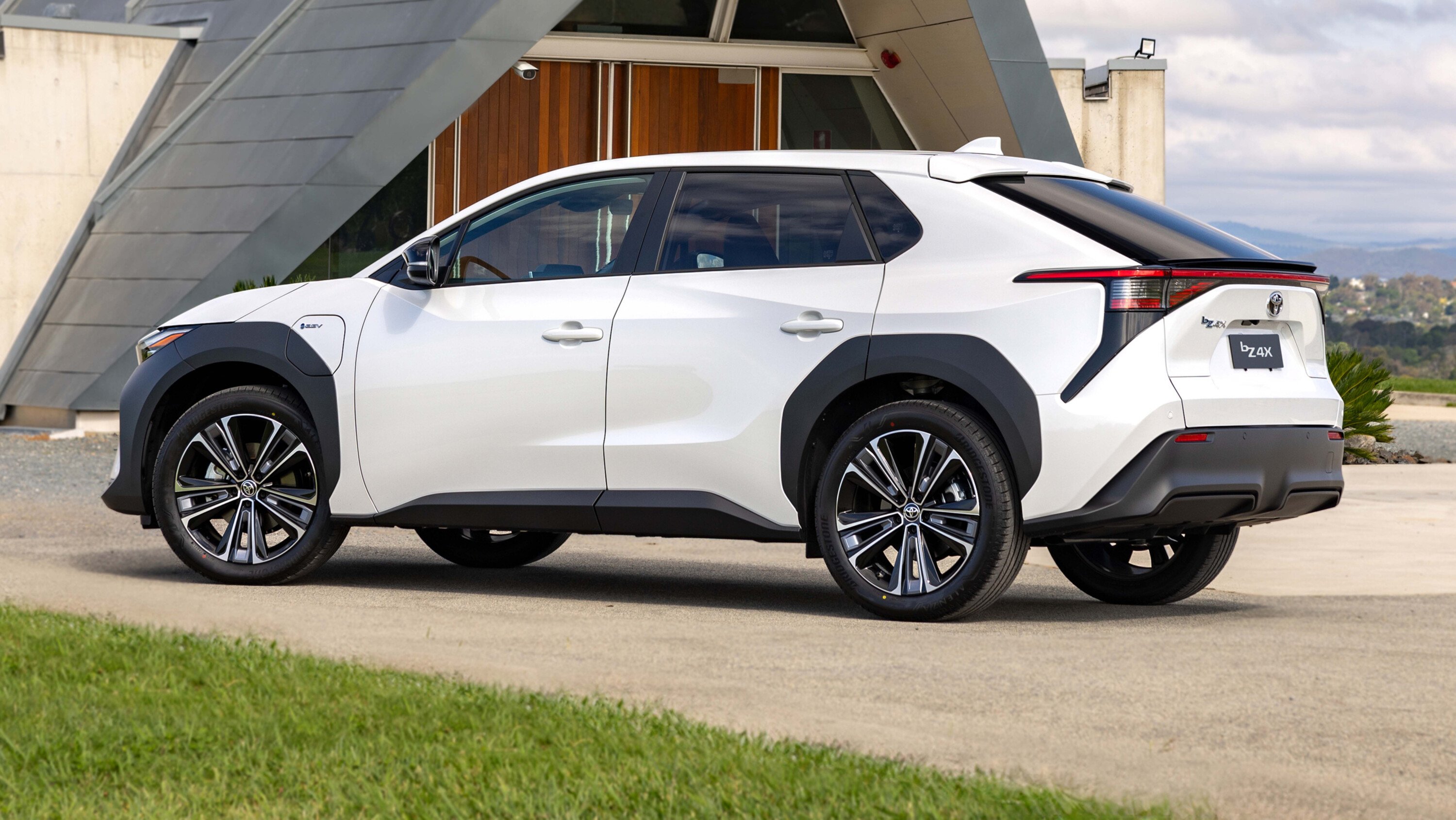
JUMP AHEAD
- How much is it, and what do you get?
- How do rivals compare on value?
- Interior comfort, space, and storage
- What is it like to drive?
- How safe is it?
- Efficiency and charging
- Warranty and running costs
- VERDICT
- Specifications
How much is it, and what do you get?
The bZ4X is available in two trims named by their powertrain, with the front-wheel drive entry grade priced at $66,000 (clickety-click) before on-road costs.
With a few more features and all-wheel drive the bZ4X AWD commands $74,990, also before on-road costs.
On the day of the media event, Toyota Australia vice president sales, marketing and franchise operations Sean Hanley confirmed there were around 170 orders in the bank for Toyota’s first EV. The brand still expects the front-drive model to be most popular.
| 2024 Toyota bZ4X FWD features | |
|---|---|
| 20-inch alloy wheels | LED headlights and foglights with adaptive highbeam |
| Auto tailgate | 7.0-inch digital driver display |
| Power tailgate | Keyless entry and push-button start |
| Fabric and ‘Softex’ lynthetic upholstery | Eight-way power driver’s seat with front seat heating |
| Leather-accented steering wheel | Dual-zone climate control |
| 12.3-inch touchscreen | Wireless Apple CarPlay and Android Auto |
| Hey Toyota’ voice functionality | Connected services with over-the-air updates |
| Four cup holders and eight bottle holders | Toyota Safety Sense including adaptive cruise control |
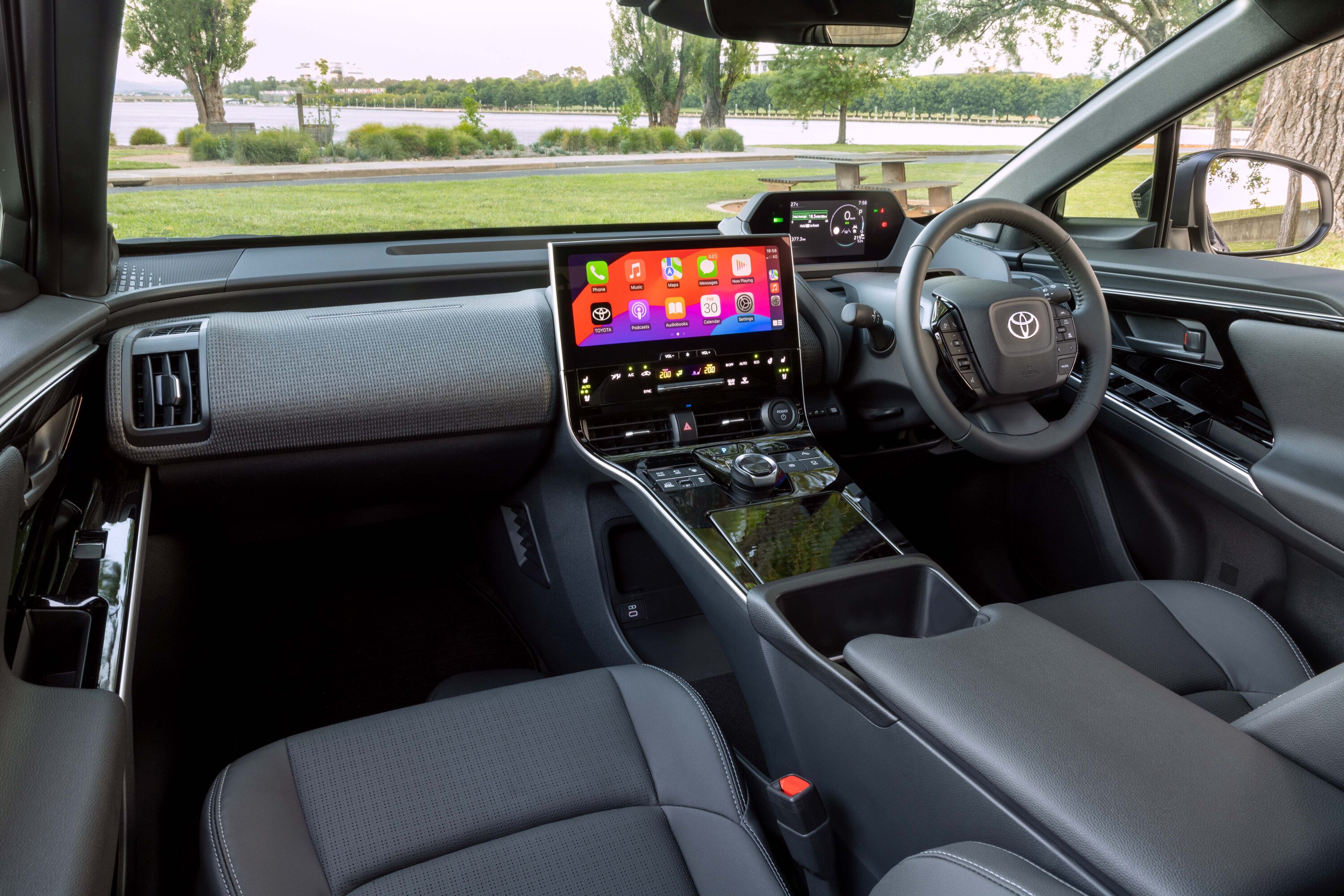
The range-topping AWD gets a few extra goodies, the most notable for our market being ventilated seats. It’s a shame that Toyota didn’t choose to offer this same trim with front-wheel drive for a lower cost.
| 2024 Toyota bZ4X AWD features | |
|---|---|
| Roof spoiler | Fixed panoramic roof |
| Gloss black bonnet accent | Premium full ‘Softex’ synthetic leather upholstery |
| 10-watt wireless charger | Ventilated front seats |
| Heated steering wheel | Blind-spot monitoring and safe-exit assist |
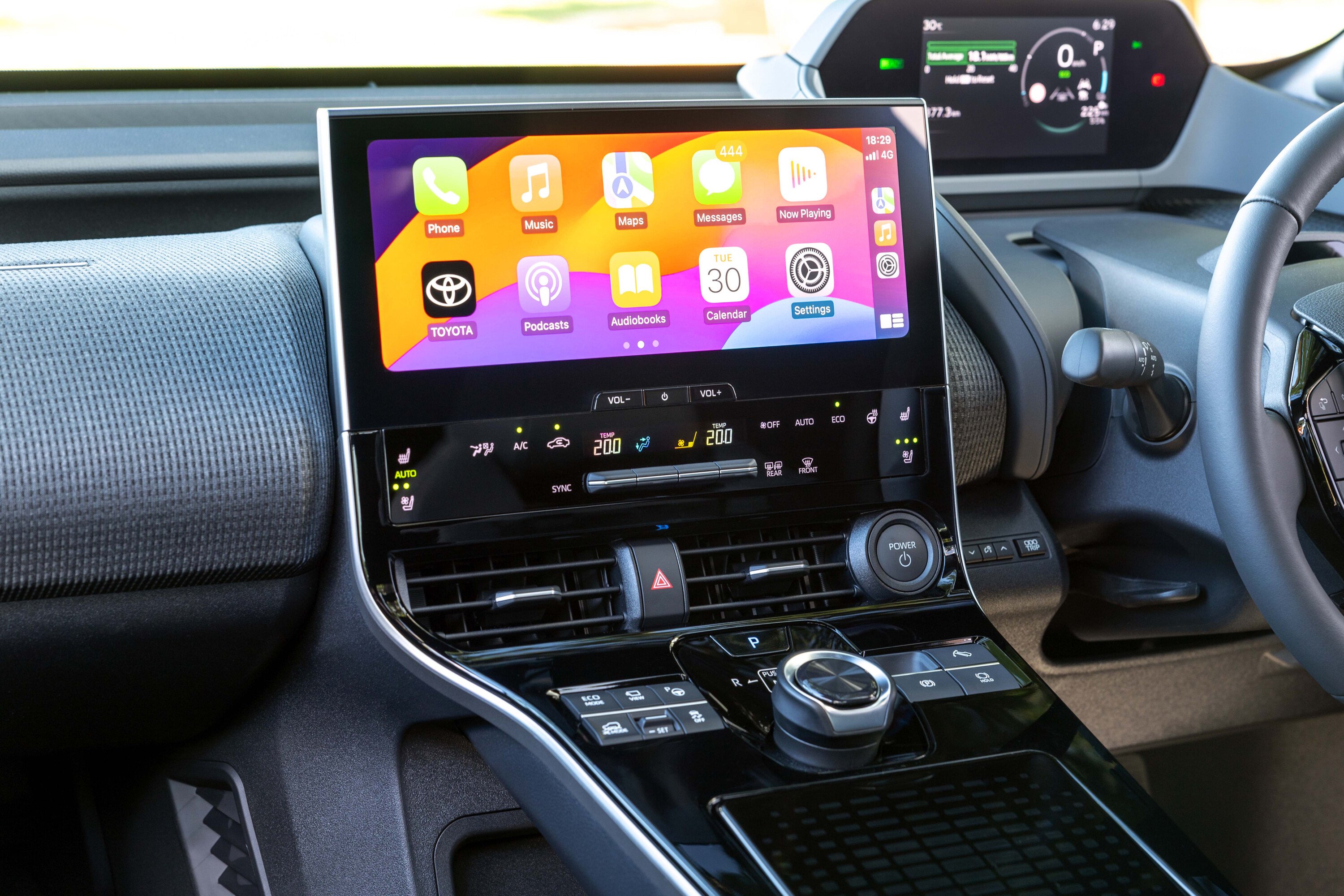
Toyota says its new full-service lease might be a better option for those nervous about electric vehicle residual values.
Monthly payments during the scheme’s three-year term cover the ‘rent’, servicing (including tyres), registration, and insurance costs.
At the end of the period you either hand the bZ4X back to Toyota or begin another three-year lease. It’s not cheap, though, Toyota’s configurator showing $1752 per month (at the time of publishing, subject to plenty of individual fluctuation) for the front-drive model if you travel 15,000km per year. That equates to $21,024 annually, or $63,072 over three years.
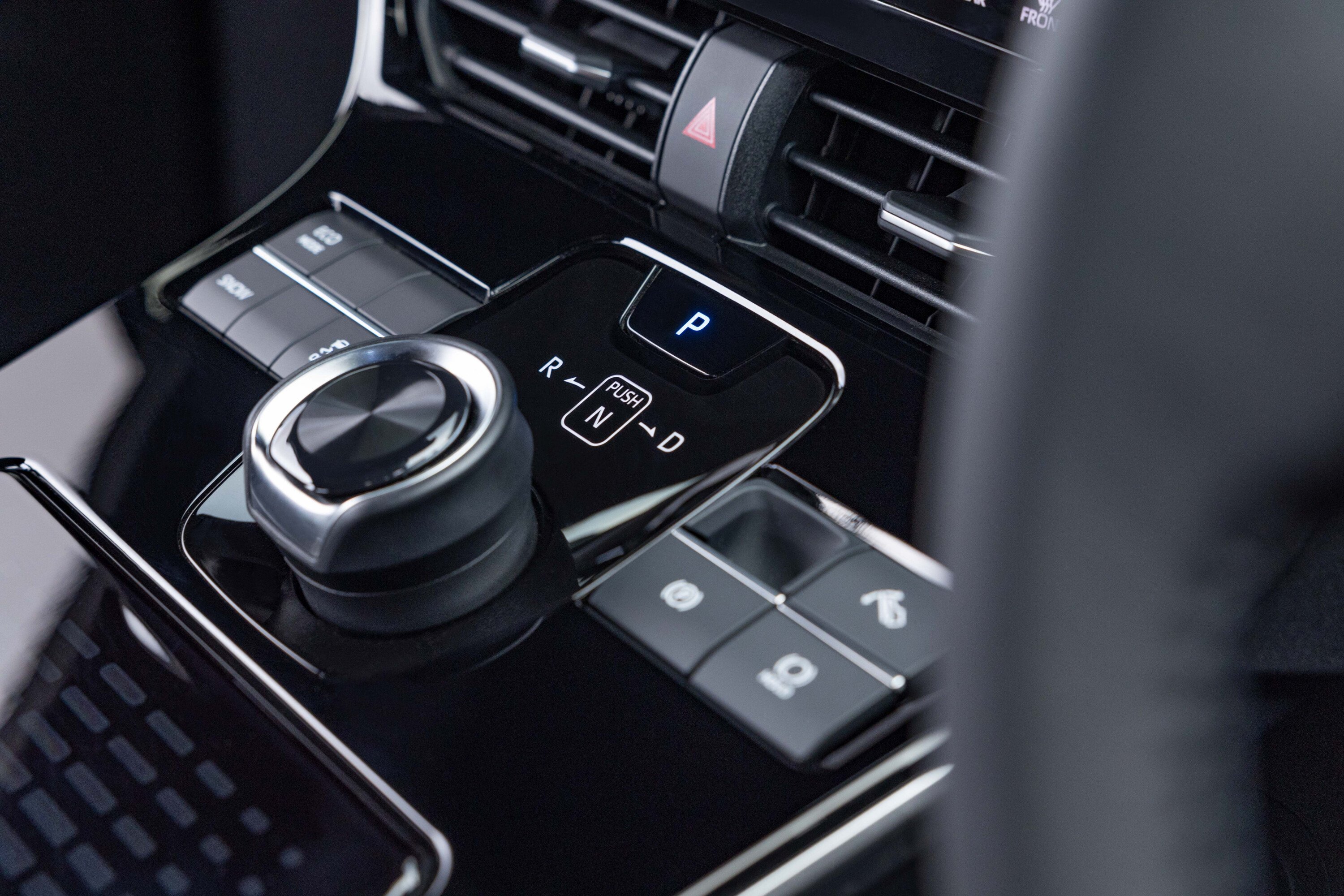
How do rivals compare on value?
It’s hard to ignore Subaru’s very similar Solterra which had its price slashed just before last week’s launch.
That’s brought the Solterra and bZ4X much closer in price terms and unlike the pair’s similarly twinned GR86 and BRZ coupes, the two electric SUVs do differ quite a bit in specification.
As well as standard all-wheel drive, the base Solterra, for example, gets two motors, heated rear seats and steering wheel, digital rear-view mirror, blind-spot monitoring, and rear cross-traffic alert to help justify its $3990 premium over the front-drive bZ4X, yet misses the Toyota’s connected services.
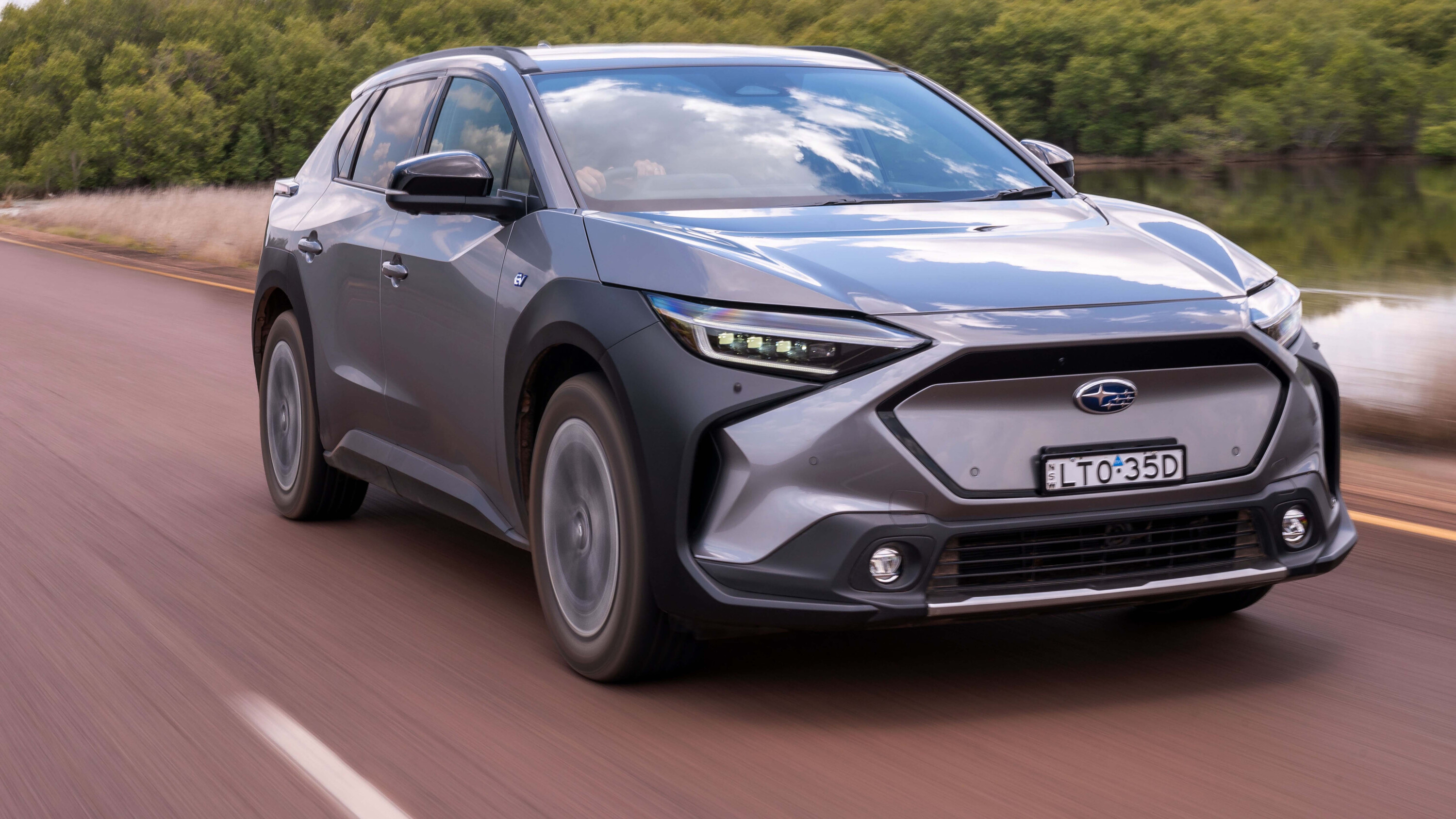
At the pointy end, both vehicles get a little extra kit and match on 20-inch alloys, though the Toyota one-ups with front seat ventilation compared to the Solterra’s driver seat memory function.
When it comes to non-related rivals, the bZ4X’s base price puts it a whisker above the $65,400 Tesla Model Y RWD (though the Toyota loses out on range and tech) while undercutting the 77.4kWh Ioniq 5 RWD ($70,400), so the bZ4X seems priced in the ballpark.
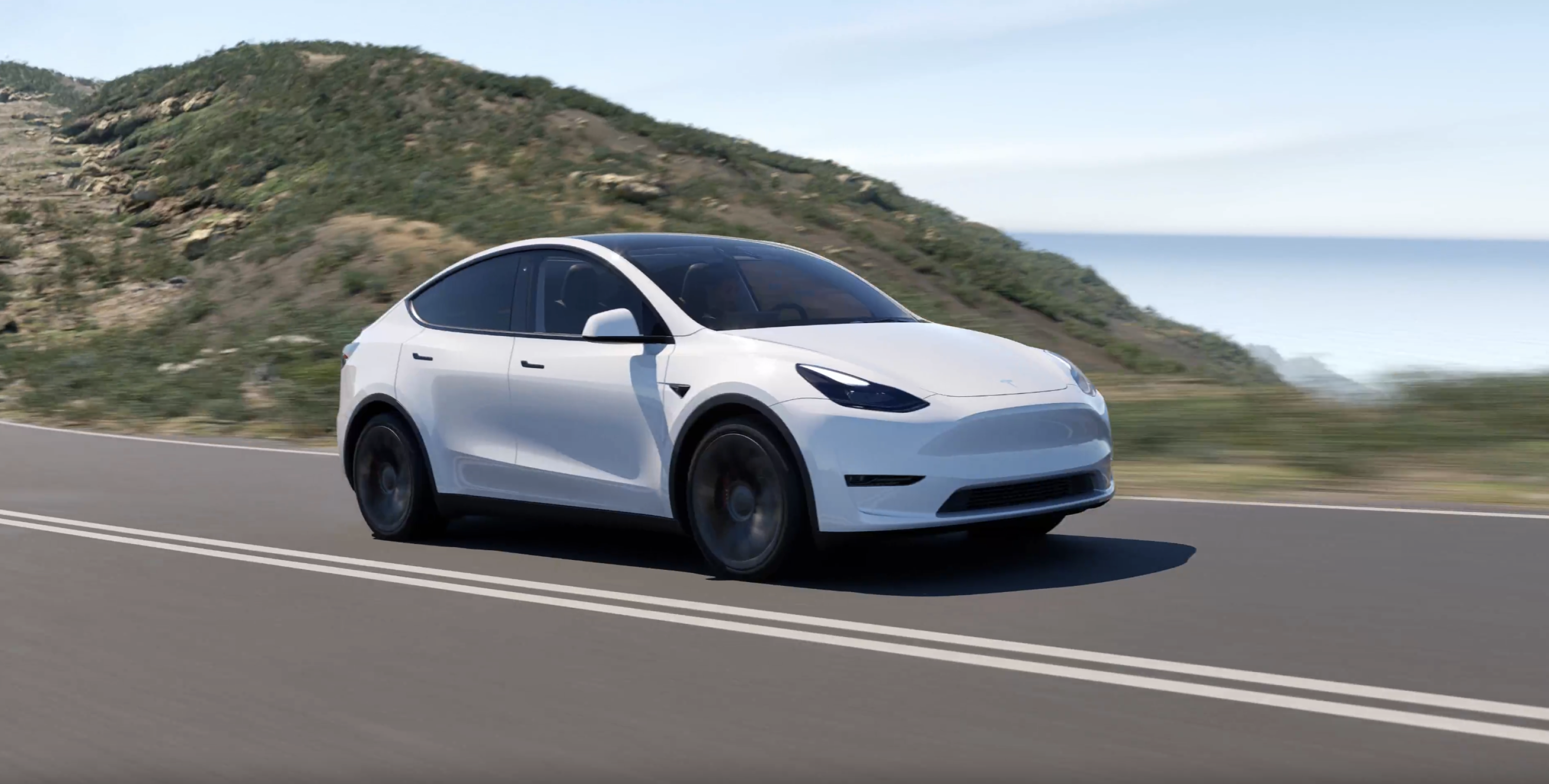
Interior comfort, space and storage
On a macro level, the bZ4X’s interior is quite a departure from Toyota’s normal style. It has a funky new centre console and unique dash design encased in a tactile cloth covering.
A deeper dive reveals familiar Toyota attributes: the operating system behind the 12.3-inch touchscreen is the same clunky software as a Corolla Cross (including wireless Apple CarPlay and Android Auto functionality), there are very familiar materials on the doors and steering wheel, and around the cup holders is a ring of scratchy HiLux-grade plastic that severely cheapens the vibe inside.
Practicality is excellent, though, with two deep cup holders, a reasonable cubby concealed under the sliding centre armrest, and space for both 1.5-litre and 500mL bottles in each door bin.
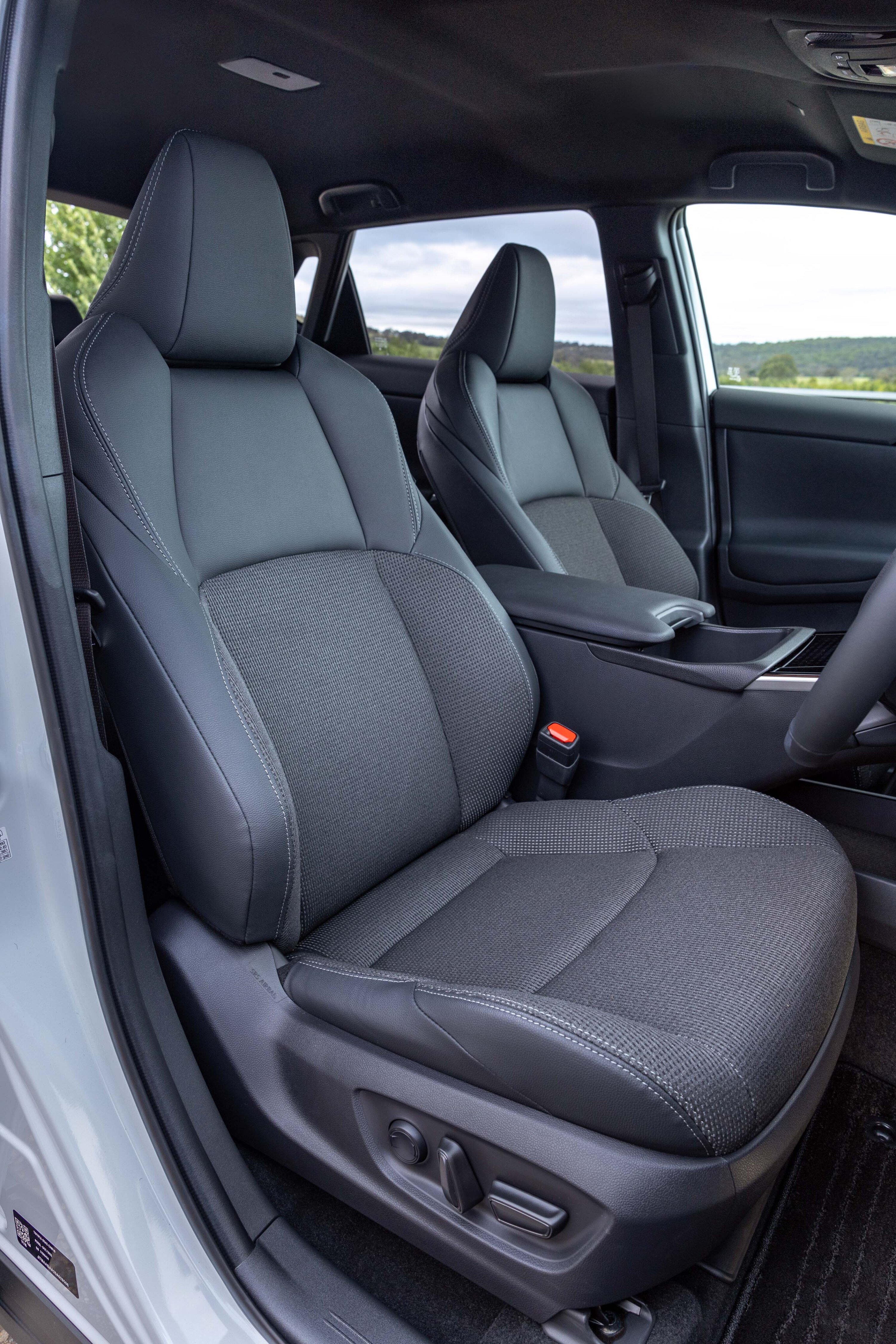
The bZ4X AWD’s wireless charging pad sits under a semi-sheer cover behind the unconventional gear selector with a USB-A charge point in there as well.
A further two USB charge points and a 12-volt socket can be found under the console where there’s also a space perfect for a small bag or snacks.
The seats (either cloth-centred or full ‘Softex’ synthetic leather) are comfortable with a good range of adjustment. The bZ4X’s unconventional ‘Peugeot-lite’ driving position and small 350mm diameter steering wheel mean some may struggle to find a comfortable driving position that also gives them a clear view of all information on the 7.0-inch instrument display.
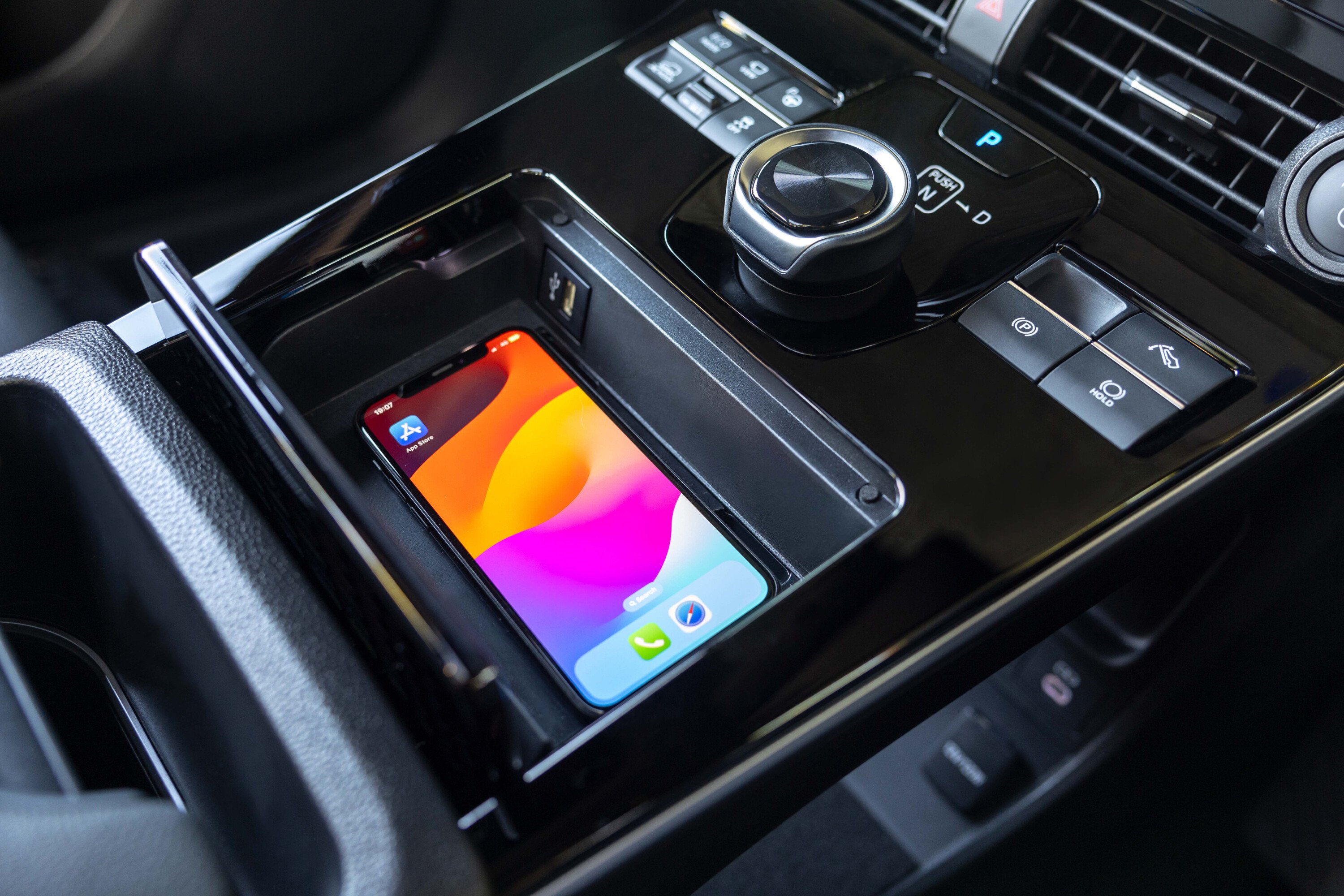
On both grades, the front passenger seat is height adjustable and, as a bonus, the range-topping AWD has seat ventilation that helps massively on hot days – especially if you have the fixed glass roof’s blind rolled back.
Owing to that glass roof, the bZ4X has a more spacious-feeling cabin than a RAV4 – especially so with the AWD’s light grey interior option. The spacious feeling is backed up by raw numbers: it offers 68mm more front and 34mm more rear knee room than the popular mid-size SUV.
The rear bench is set fairly high, offers two recline positions and gives passengers a good view out. There are air vents back here (that appear to be the same part used in HiLux dual cabs) and USB charge points along with deep-pile floor mats that look straight out of the ’80s.
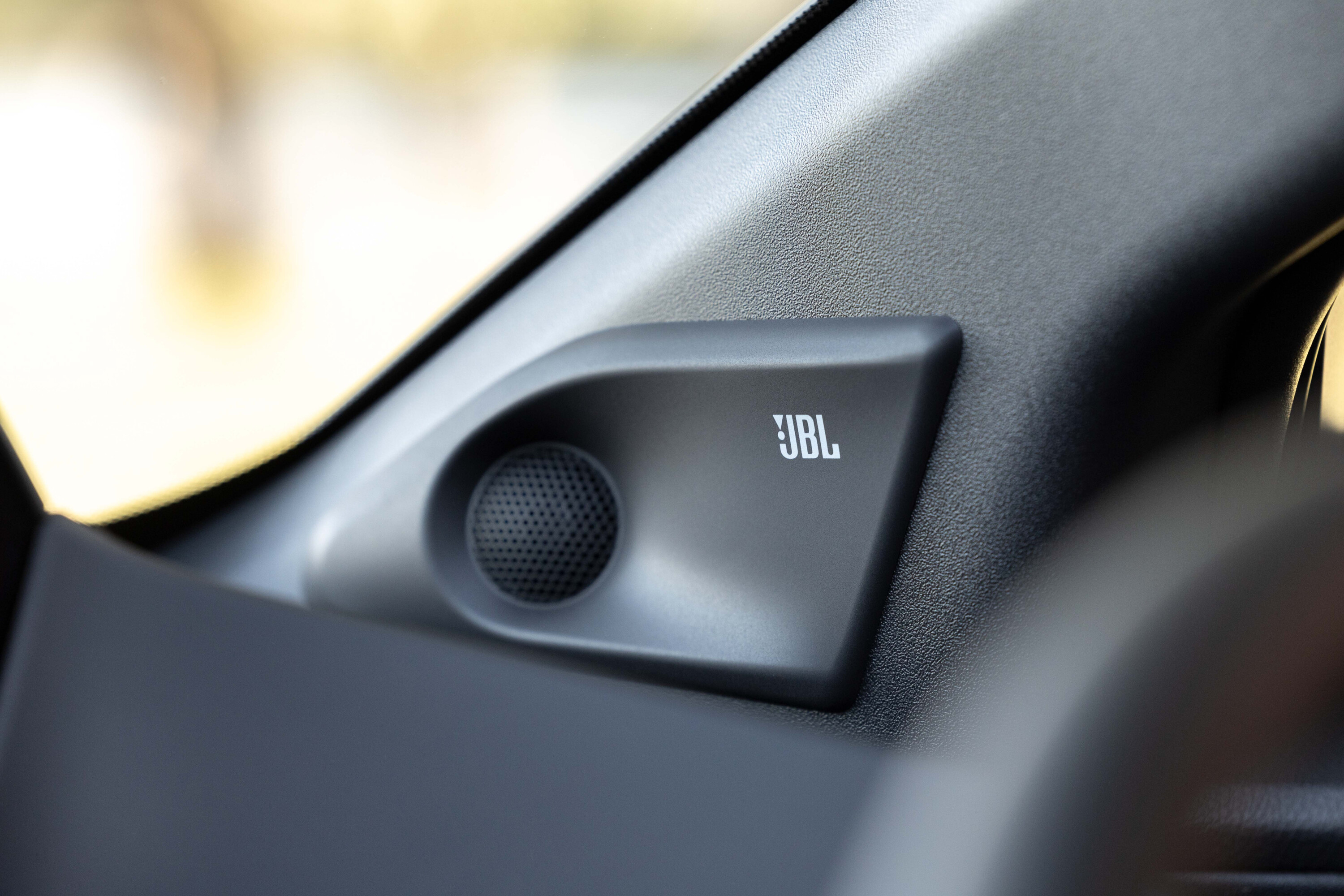
Being 35mm lower than a RAV4 has its disadvantages, though, not least in terms of rear headroom. If you’re under 180cm you probably won’t be bothered, but at 188cm my head brushed the ceiling.
Toe room is tight with the front seat in its lowest position and the bZ4X’s bench is lacking under-thigh support – both common complaints with skateboard-style EVs.
A power tailgate features on both grades with gesture-controlled hands-free opening on the AWD, beneath which is a boot that measures between 441-452 litres (including under-floor storage) depending on whether you go for the single- or twin-motor.
There’s a little storage beneath the false floor, ideal for storing charging cables and the cargo cover when not in use.
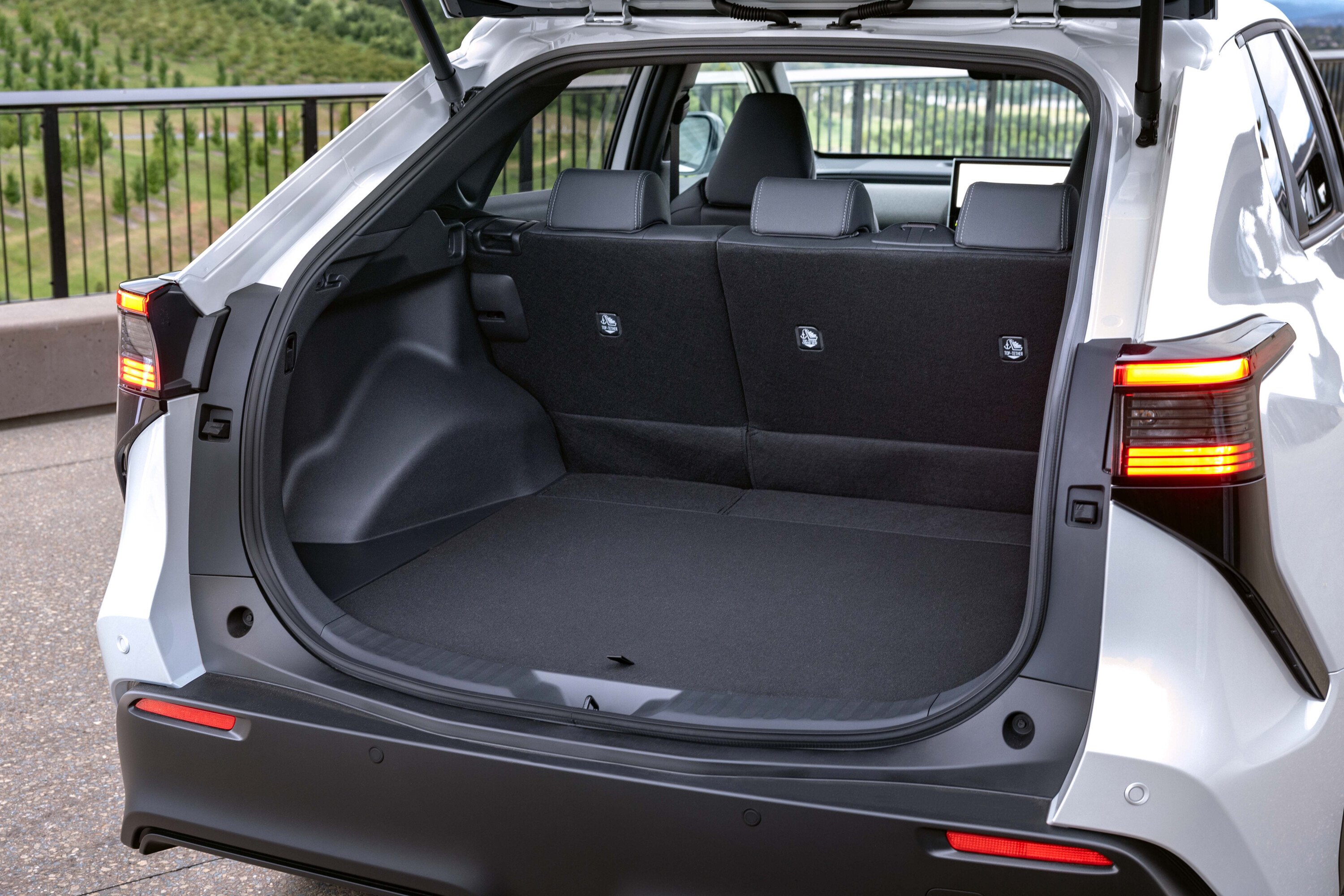
What is it like to drive?
If you were to imagine an electric Toyota RAV4 with a little bit of Subaru Forester all-wheel-drive DNA thrown in, you’d be pretty close to the bZ4X experience.
Acceleration is plenty reasonable in either the 150kW/260Nm front-drive model or the slightly punchier 160kW/337Nm all-wheel drive models. Their respective 0-100km/h claims of 7.5 and 6.9 seconds feel believable.
Unusually, the AWD bZ4X uses a pair of 80kW motors to simulate Subaru’s signature symmetrical set-up, rather than rear-biased systems adopted by many rival manufacturers.
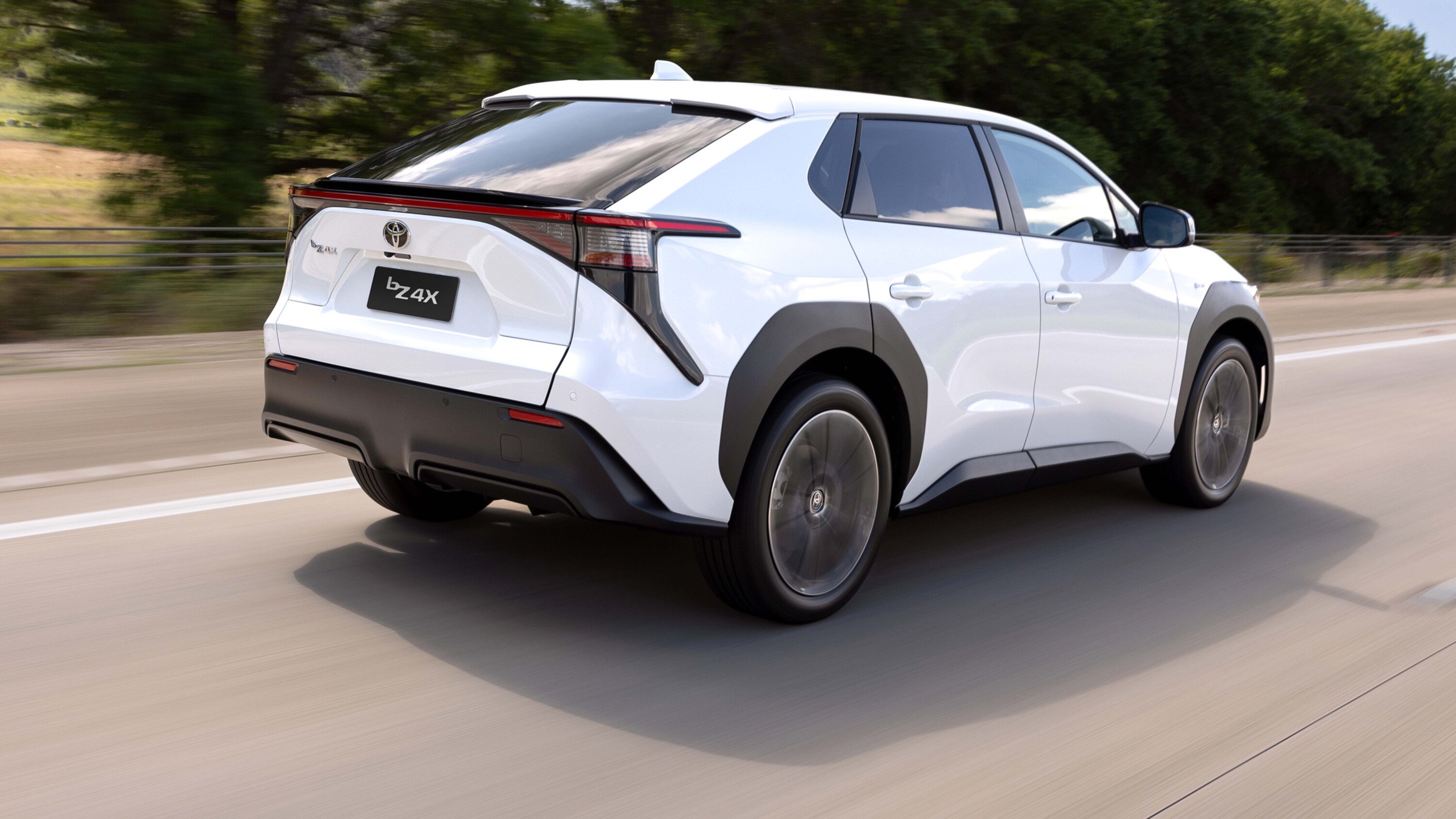
Toyota has clearly paid attention to accelerator and brake calibration, introducing a smooth tip-in for the bZ4X’s right pedal. The brake pedal – which blends regenerative and caliper braking – is also natural and progressive.
Rather than bring the SUV to a stop, the bZ4X’s maximum regen setting lets you creep at 7-10km/h like a regular automatic. The lack of a true one-pedal driving mode might rule it out for EV die-hards but it stops any nasty ‘cabby-foot’ lurching.
There are two on-road drive modes, Normal and Eco (which adjust all sorts of parameters, including air conditioning, which is smart enough to know many occupants are on board and keep only them cool without wasting energy).
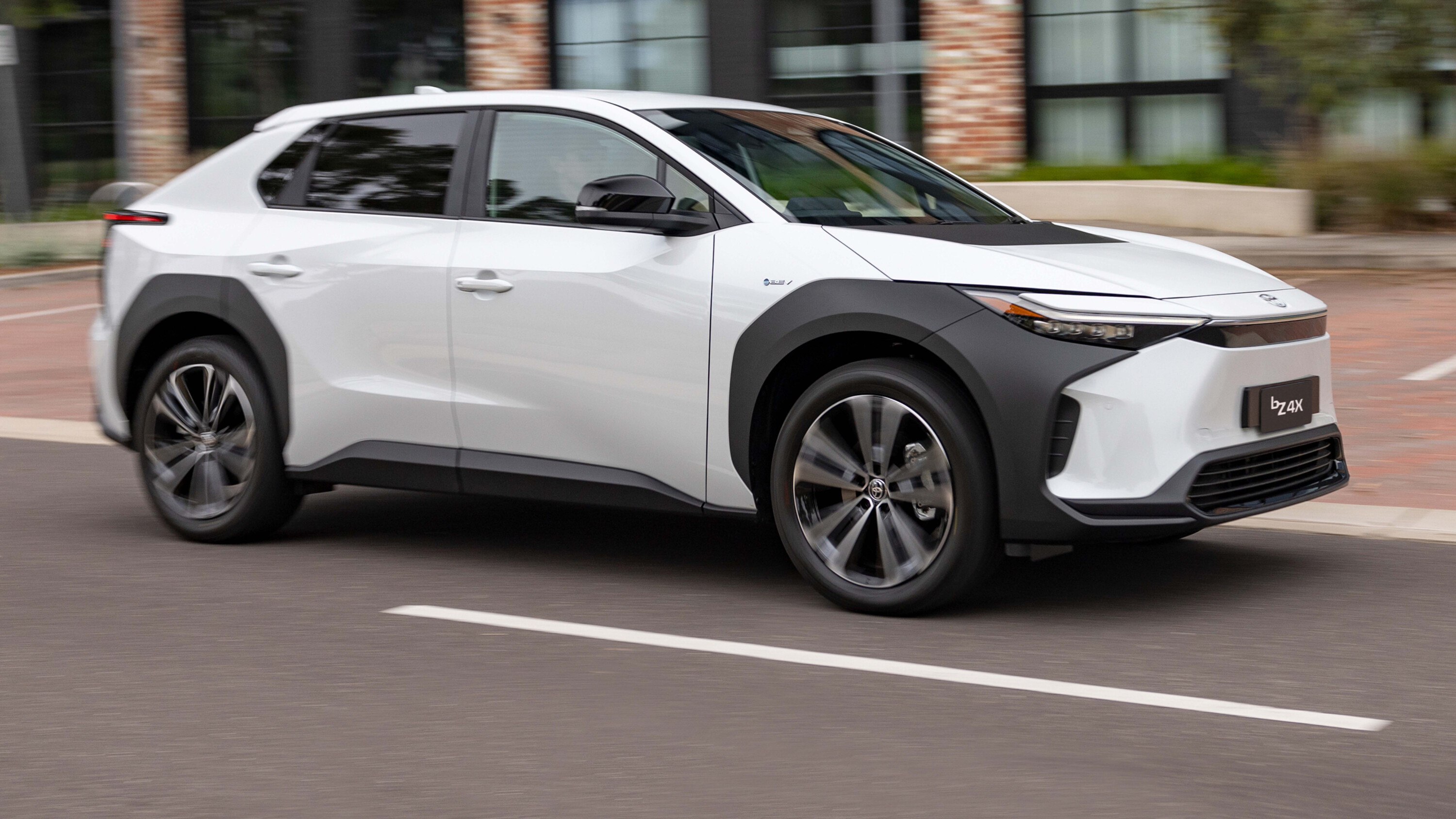
In all-wheel-drive guise, the bZ4X also shares Subaru’s X-Mode system that has settings for high-speed gravel ‘Snow/Dirt’ and low-speed technical obstacles ‘Deep Snow/Mud’.
There’s also a ‘Grip Control’ off-road cruise control mode that we tested extensively in Japan and left us mighty impressed. Toyota’s chosen drive program took us on some light dirt roads that both front- and all-wheel drive guise versions of the bZ4X dispatched easily. The AWD boasts 212mm of ground clearance so you can get a little more ambitious with your off-roading.
Heading back to the blacktop, where the bZ4X will live most of its life, revealed quite a lot of tyre roar from Australia’s gnarly coarse-chip tarmac. The 235/50 R20 Bridgestone Alenza tyres transmitted a high-frequency buzz into the cabin on these common surfaces.
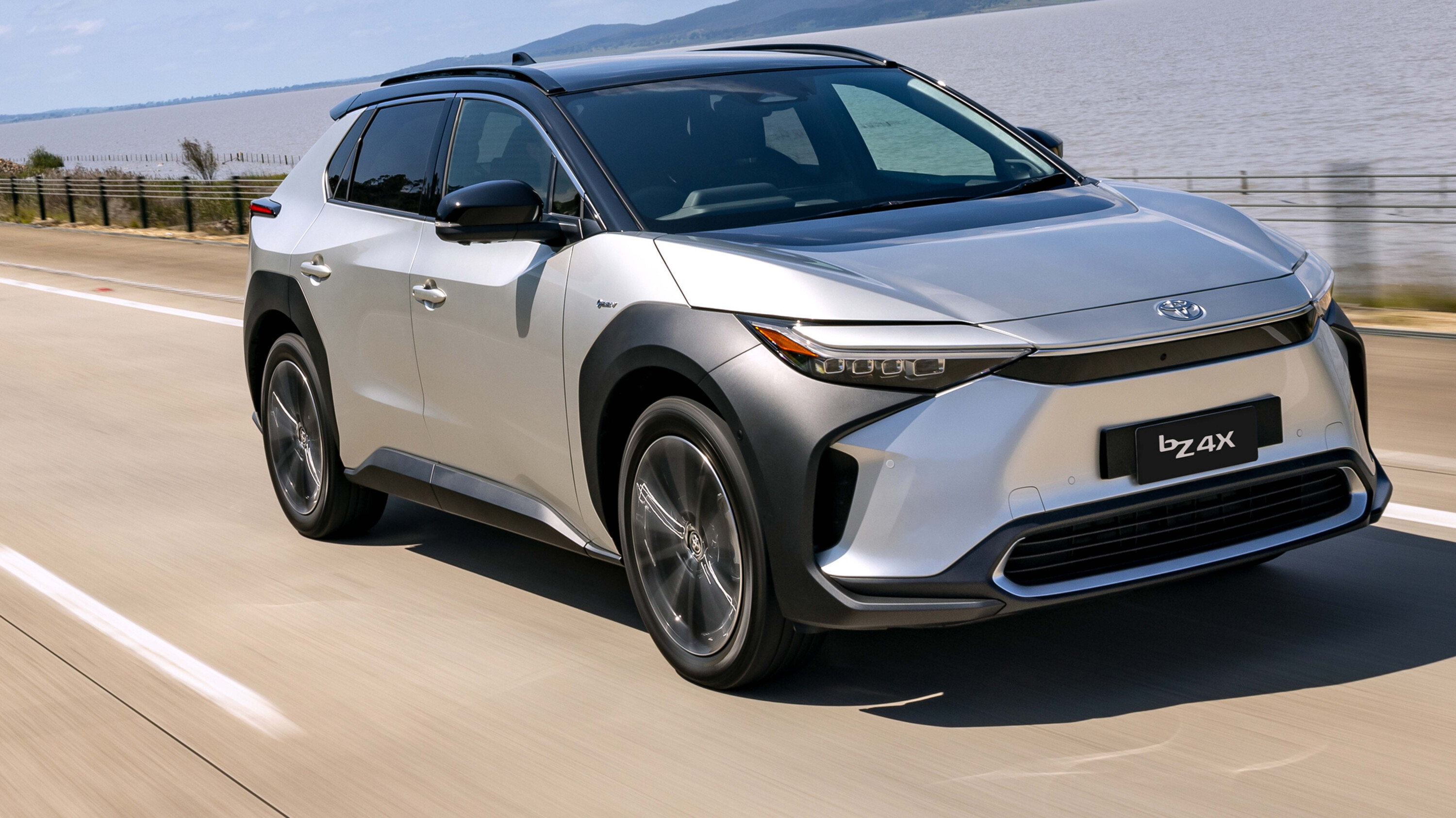
Ride comfort is generally good with struts up front and a multi-link independent rear axle, though the 1960kg-2055kg bZ4X is a firmer proposition than the looser-limbed RAV4.
The trade-off is minimal roll in corners and impressive dynamics; the bZ4X captures some of that TNGA magic that pervades Toyota’s current crop of passenger cars.
Although the all-wheel drive bZ4X was a little less dynamic and adjustable mid-corner, it won out overall for being secure and planted through bends.
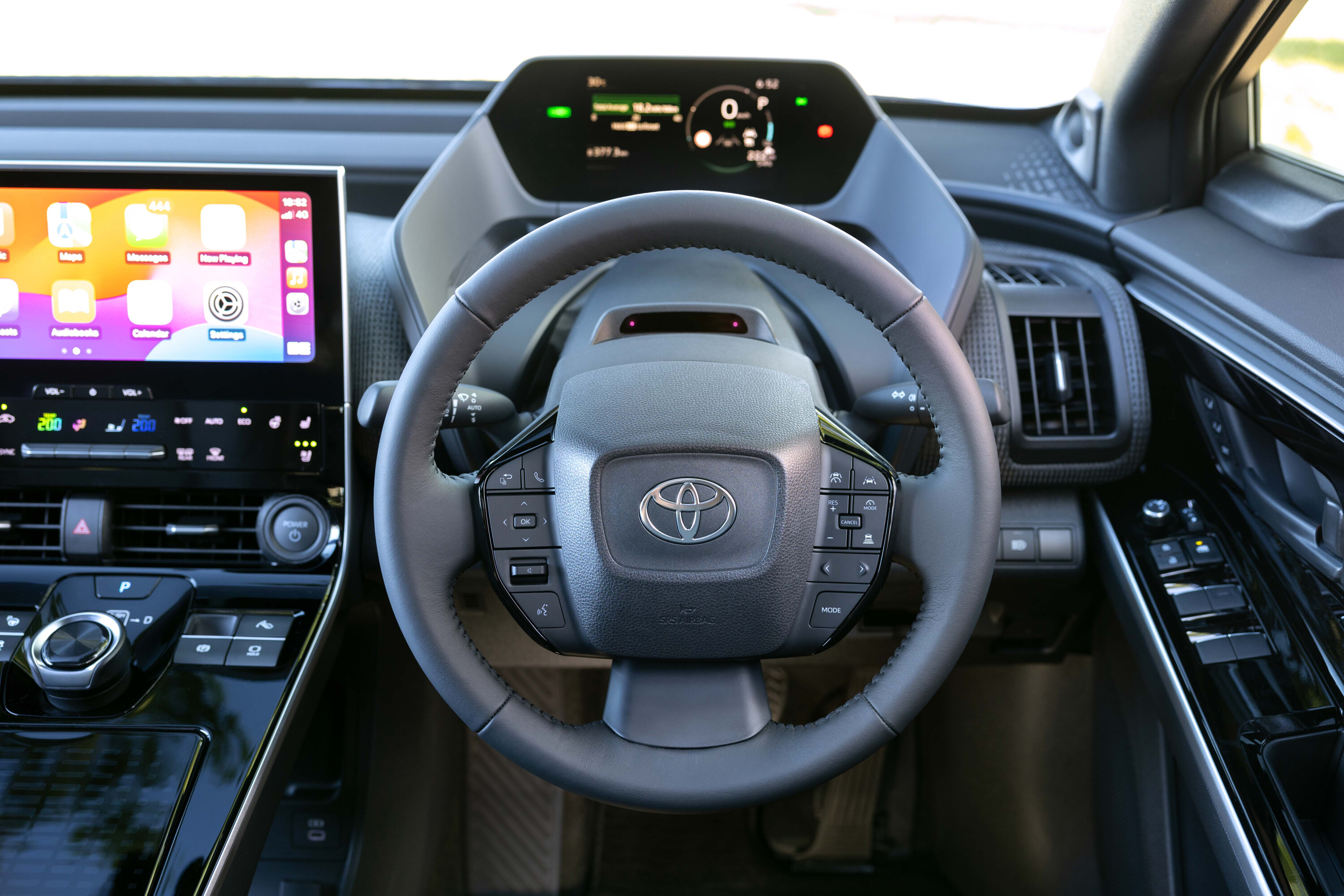
“A Toyota person puts the brake on when you have a corner, but Subaru [drivers] put the accelerator on to control the vehicle.” – Toyota bZ4X chief engineer Masaya Uchiyama
This security comes from the joint venture, with chief engineer Masaya Uchiyama explaining the cultural difference behind each company’s driving style on loose surfaces at high speed: “A Toyota person puts the brake on when you have a corner but Subaru [drivers] put the accelerator on to control the vehicle”, he said.
When cruising through suburbs and country roads we found the bZ4X’s 2.81-turn lock-to-lock steering a little gluggy, though it lightens up when parking. There’s an auto-park feature on the top grade, too.
Visibility is good for this class of EV with a generous glass house, and the top-spec car scores a 360-degree camera system with multiple views.
If any of the terms in this section have left you scratching your head, these articles will help bring you up to speed!
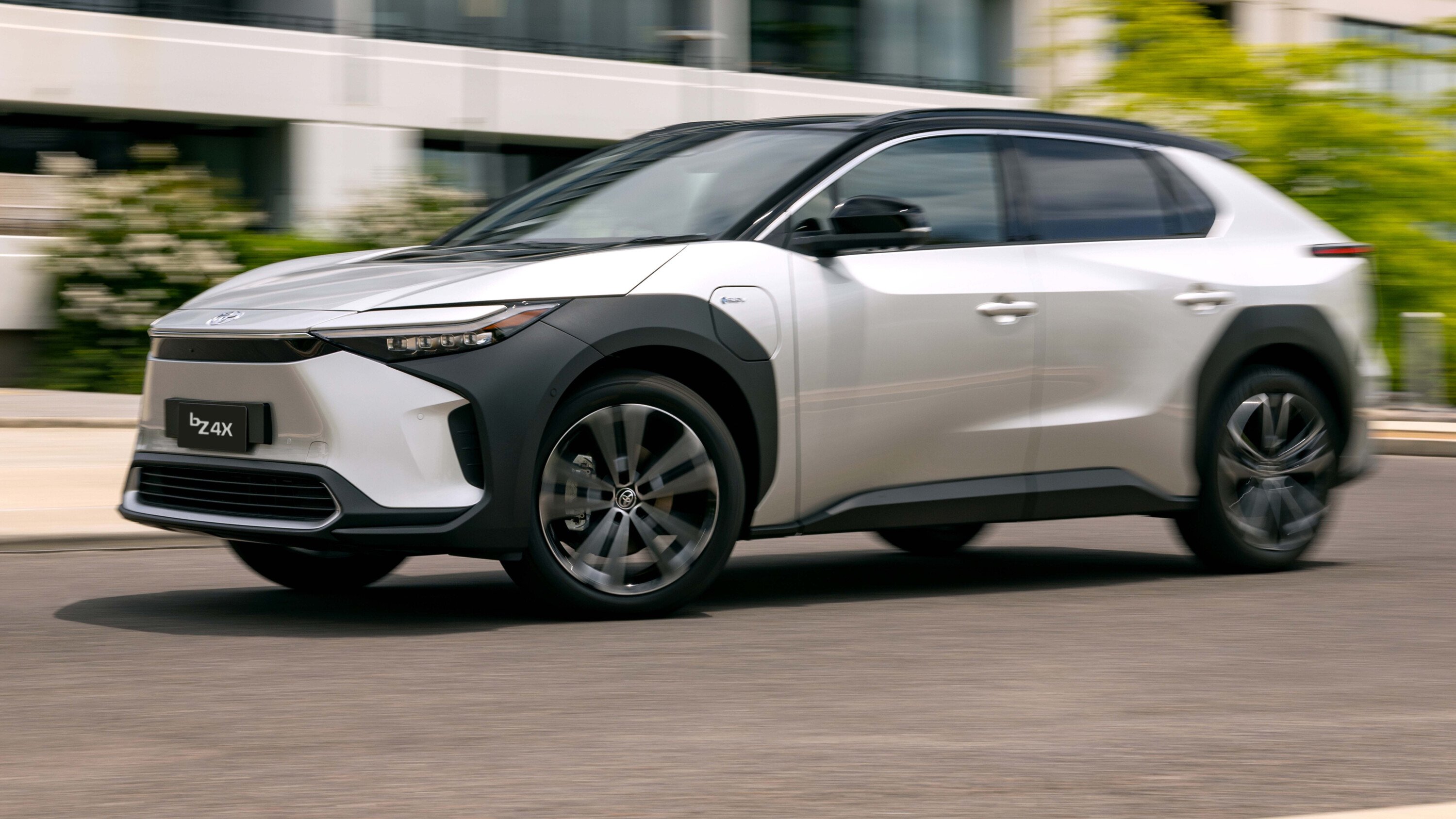
- What is a Powertrain or Drivetrain?
- Power vs torque
- Car suspension explained
- Automatic transmissions (‘gearboxes’) explained
- Chassis control systems explained
- Car vs Ute vs SUV: How the vehicle you buy should guide the way you drive
- What is the WLTP emissions and range test?
The Toyota bZ4X was awarded five ANCAP stars in 2022 testing.
It features front AEB with pedestrian and cyclist detection, adaptive cruise control, lane-keep assist and eight airbags. Driver attention and blind-spot monitoring are sadly reserved for the AWD trim – not the case in Subaru’s Solterra.
Toyota’s latest lane-keep assist is much-improved, but our preference was still to have it switched off. The AWD’s driver monitoring wasn’t too intrusive, either.
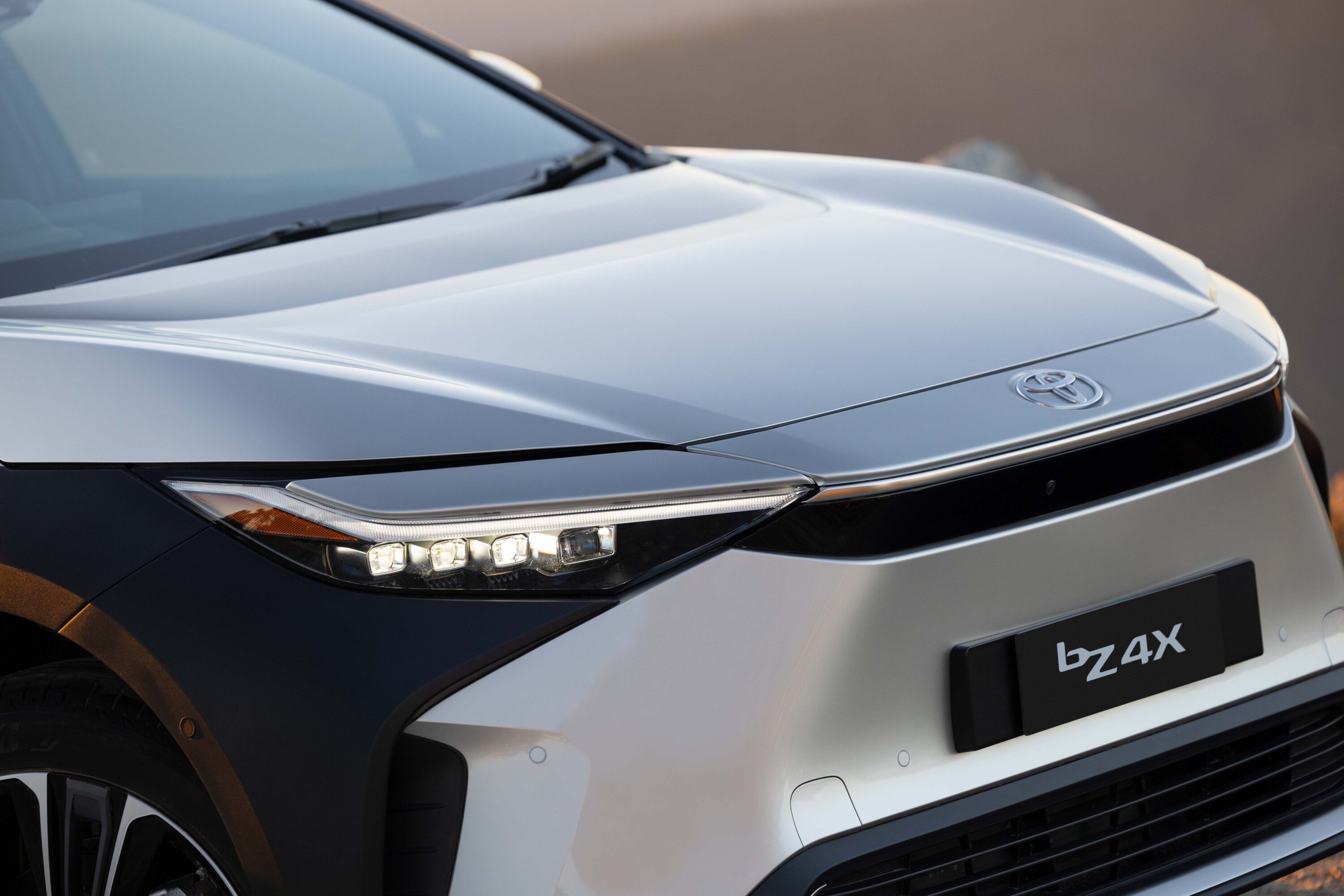
Efficiency and charging
The bZ4X’s conservative engineering is most obvious when it comes to batteries. Toyota’s lithium-ion pack has a 71.4kWh gross capacity, yet its usable capacity is 64kWh.
It’s a much bigger gap between the total cells installed and usable capacity than you’d find in rivals such as the Hyundai Ioniq 5 (77.4kWh gross and 74kWh usable). Toyota says it chose to engineer in a greater margin of safety as it wishes to limit battery deterioration and fire risk.
Toyota quotes European WLTP ‘high’ test consumption results in its Australian literature, which are 16.9kWh/100km for the FWD and 18.1kWh/100km for the AWD resulting in respective 436km and 411km driving ranges.
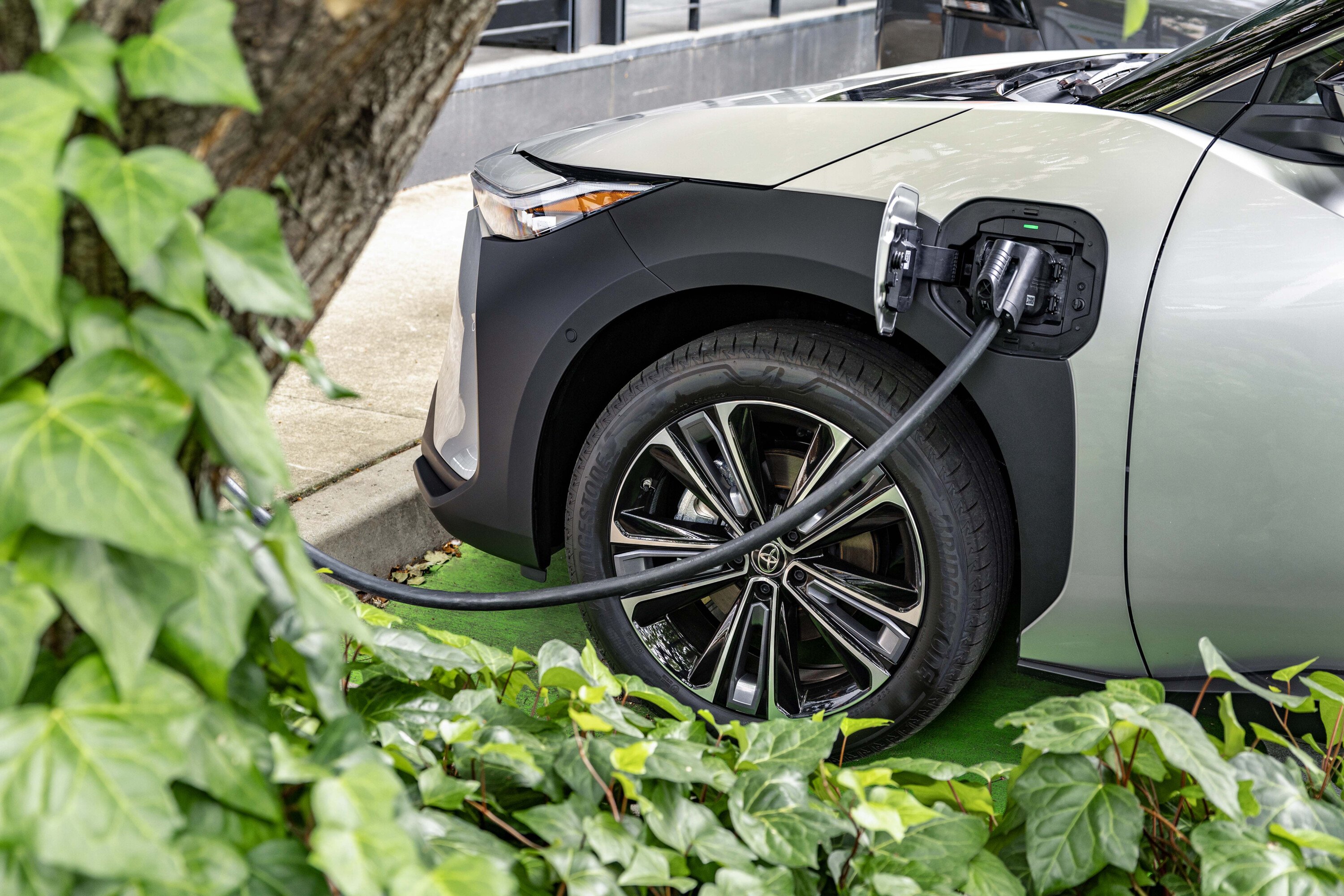
After about 150km of country and suburban driving, the AWD bZ4X’s trip computer read 19.6kWh/100km for a real-world range of 335km.
Functionally, you’ll be able to travel around 230km (going from 80 per cent to 10 per cent charge) between stops at a DC rapid charger if you’re on a road trip.
The bZ4X will accept DC electricity at up to 150kW, rejuvenating its battery from 10-80 per cent in around 30 minutes. Three-phase AC charging at 11kW will take around seven hours to replenish the bZ4X’s battery from flat to full.
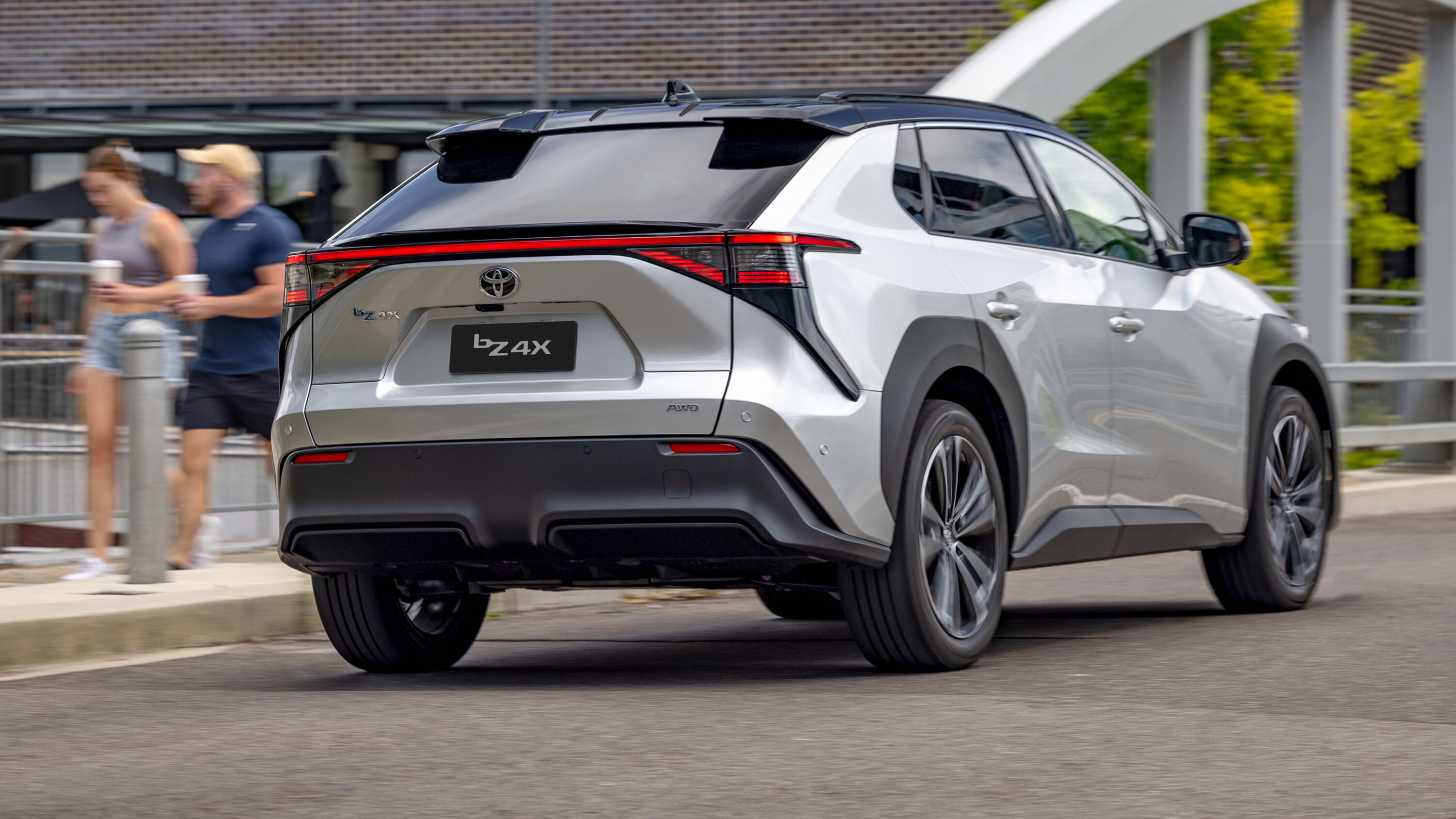
Warranty and running costs
Toyota covers the bZ4X with a basic five-year unlimited-kilometre warranty. Like its hybrid vehicles, this can be extended to 10 years if you come in for a health check after the first five.
Developed with Panasonic, the battery itself is under a different seven-year guarantee. However, Toyota’s testing has found deterioration is limited to 90 per cent over 10 years and 250,000km.
Servicing is due every 12 months/15,000kms, costing $180 for each of the first five. Why annually when Polestar and Tesla only mandate two years or per condition? Toyota says it helps keep tabs on wear items such as tyres and suspension components to ensure long-term safety and reliability.
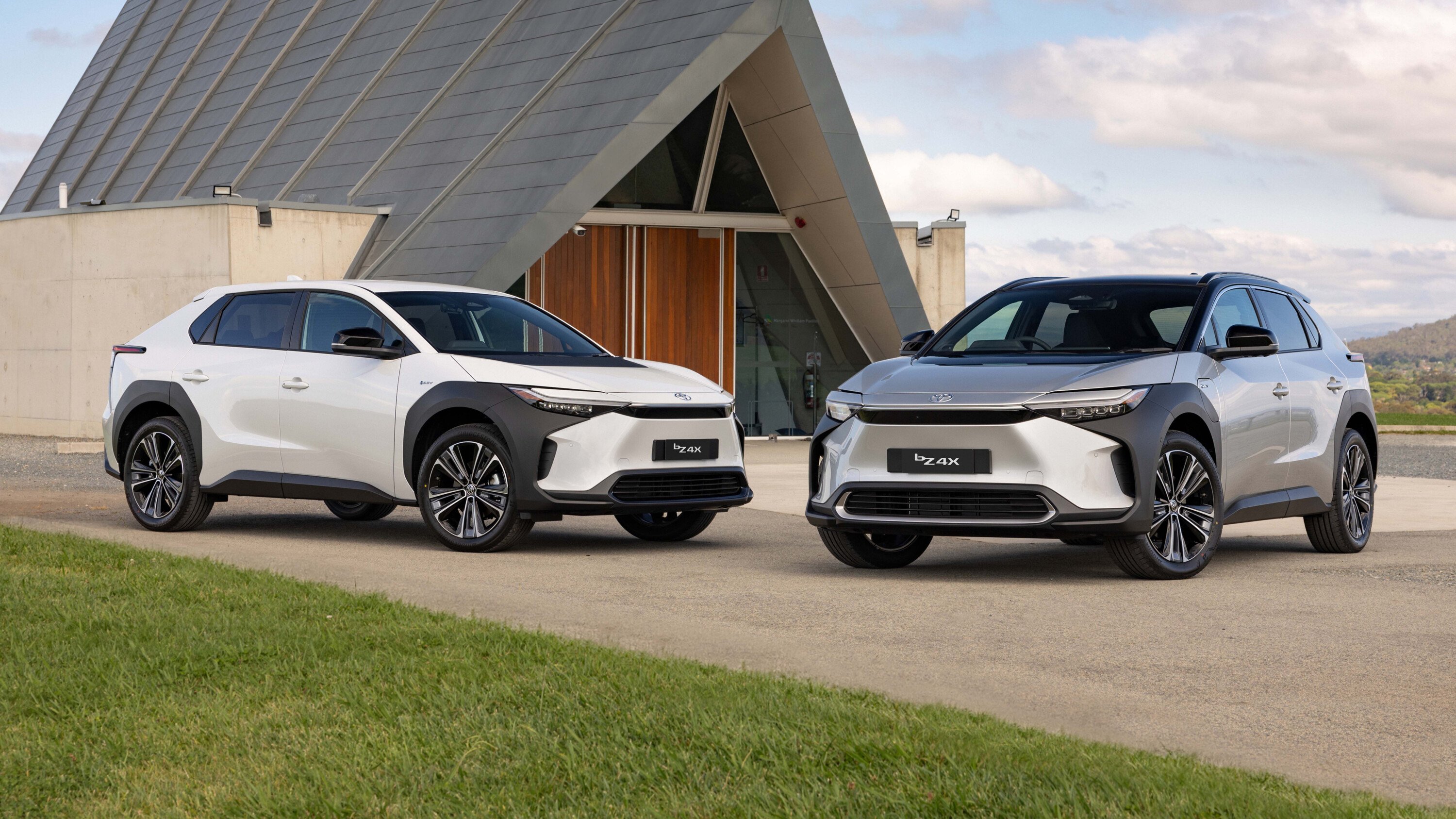
VERDICT
If you’re the owner of a RAV4, Forester, Tiguan, or other conventional medium SUV, the bZ4X (and its Subaru counterpart) offer a friendly step into the world of electrification. This conventional mid-sizer isn’t going to tickle the fancy of Tesla fans, though.
The bZ4X driving experience is familiar and the cabin isn’t full of whizz-bang technology or massive screens. As for how the SUV shapes up against legacy rivals, it could do with some improvements to battery range and charging speed to match Hyundai, Kia, and Ford.
Ultimately, the bZ4X is a decent electric vehicle backed by the world’s biggest automaker. It’s a safe bet, though one that’s unlikely to tug at your heartstrings.
The longer-range bZ4X front-wheel drive is our pick – it’s significantly cheaper, with all the gear you need while sacrificing no on-road prowess.
| Toyota bZ4X FWD | Toyota bZ4X AWD | |
|---|---|---|
| Price (drive-away) | $66,000 + on-road costs | $74,990 + on-road costs |
| Drivetrain | ||
| Engine | Single permanent magnet synchronous motor | Twin permanent magnet synchronous motors |
| Drive | Front wheel | All-wheel |
| Power | 150kW | 160kW |
| Torque | 266Nm | 337Nm |
| Gearbox | Front e-Axle single-speed 13.786:1 ratio transaxle with equal-length driveshafts | Front and rear e-Axle single-speed 13.786:1 ratio transaxles with equal-length driveshafts |
| Chassis | ||
| L/W/HB | 4690 / 1860 / 1650mm | |
| Wheelbase | 2850mm | |
| Weight (tare) | 1960kg | 2055kg |
| Battery size (gross/usable) | 71.kWh / 64kWh | |
| Energy consumption (WLTP high) | 16.9kWh/100km | 18.1kWh/100km |
| Driving range (WLTP high) | 436km | 411km |
| DC Charging (rate / 10-80%) | 150kW / ~30 minutes | |
| AC Charging (rate / 0-100%) | 11kW / ~7 hours 30 minutes | |
| Suspension | Front: Struts, coil springs | Rear: Mulit-link, coil springs | |
| Steering | 2.81-turn Electric power-assisted steering | |
| Front brakes | 328mm ventilated disc | |
| Rear brakes | 317mm ventilated disc | |
| Tyres | Bridgestone Alenza | |
| Tyre size | 235/50R20 | |
| Safety | ||
| ANCAP rating | 5* (2022) | |
| 0-100km/h | 7.5 seconds | 6.9 seconds |
Score breakdown
Things we like
- It’s an electric RAV4
- Thoughtful cabin storage
- Steadfast handling
- Smooth and user-friendly drivetrain
Not so much
- Limited real-world range
- Tyre roar on coarse chip
- Back seat is big on legroom but not much else
- Cheap materials in obvious places
We recommend
-
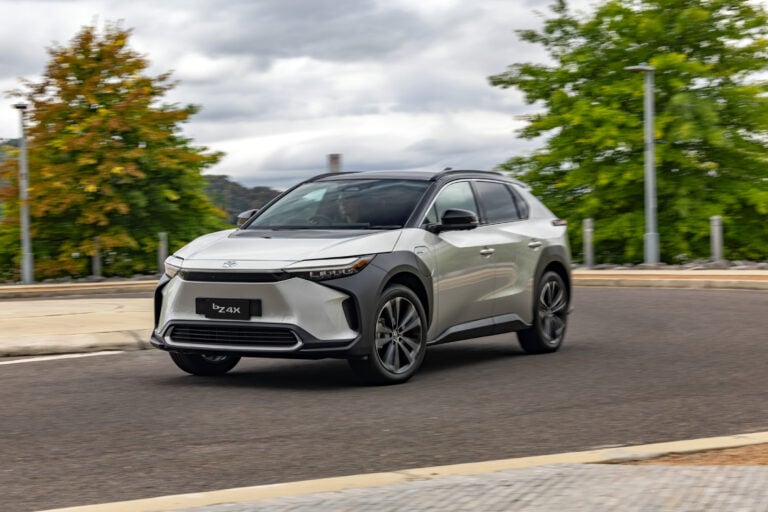 News
News2024 Toyota bZ4X pricing and features: Tesla Model Y electric SUV rival lands in Australia
At long last Toyota enters world of BEVs with bZ4X priced from $66,000
-
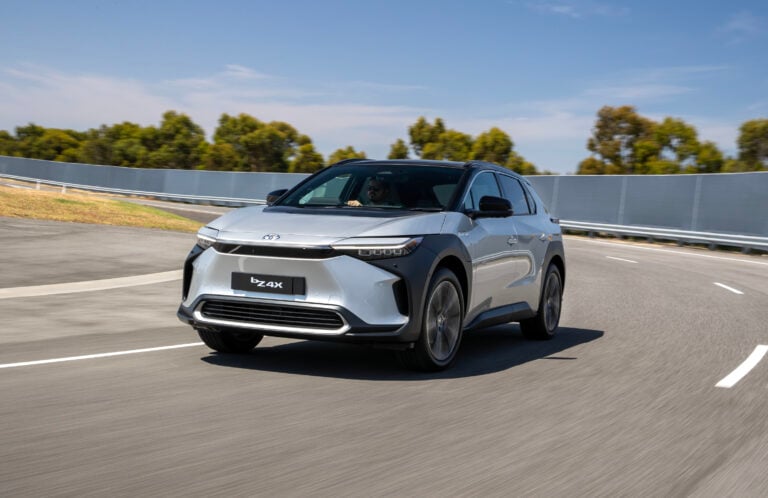 Reviews
Reviews2024 Toyota BZ4x review: First spin on Australian asphalt
Good things come to those who wait, they say – but will Toyota’s long-delayed BZ4x EV be the good thing Australian buyers have been waiting for?
-
 News
NewsNew car calendar 2026: All the new cars coming to Australia next year
Here’s the WhichCar by Wheels guide to all the new cars that will launch in Australia in 2026. Check back in regularly for updates...


